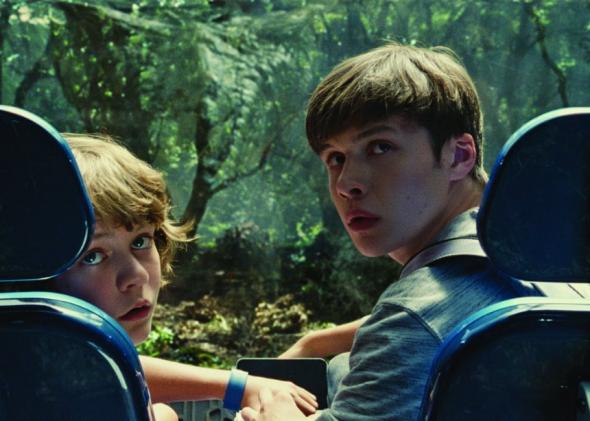Jurassic World is, unsurprisingly, a hybrid creature. On the one hand, it’s a delightful revisiting of the original Crichton material, cleverly freshened up for 2015 with subtext about drone warfare, more sophisticated gene splicing, and a depressingly accurate attitude toward product placement. Then again, the movie’s gender politics and reliance on divorce as an emotional motivator feel aggressively stuck in the early ’90s. But there’s one element of the film that is indisputably stellar: the music, which charmed me from start to finish.
Michael Giacchino, a rightful star of the film and TV composition demimonde, has brought characteristic wit and grace to his score for Jurassic World, endowing Colin Trevorrow’s film with more wonder and warmth than it probably deserves. Such feats of emotional polish are, of course, the film composer’s job, but Giacchino has accomplished something else here that’s even more impressive. Tasked with scoring the reboot of a franchise blessed by one of the most iconic, magisterial, hummable scores of all time—by film music don John Williams no less—he succeeds with not only dusting off the old themes in a new park, but also adding his own equally compelling tunes to the mix.
Giacchino has said that he was intimidated by the prospect of recasting and writing alongside the original Williams themes—but the result feels confident and, to be completely honest, pretty spectacular. Giacchino presents some of that material almost unaltered in a few choice moments, such as when we initially approach Isla Nublar—a clear callback to that still-stunning scene in the original film—or when new visitors to the renovated park stumble onto a relic from the past.
But more interesting is the way Giacchino has mastered Williams’ vocabulary in the service of making his own fresh statements. A lot of this fluency manifests on the level of tone color: Like Williams, Giacchino favors epic brass lines (especially in the gorgeously orchestrated horns) here, and he occasionally indulges in Williams’ penchant for wind and pitched percussion flourish as well. But it’s in the arena of melody that we see just how simpatico Giacchino and Williams really are. Much of the indelibility of the original Jurassic Park music is due to its brilliant simplicity. At root, the whole structure is built on the breathtaking power of disjunct motion in a melody—the space between the notes leaves us hanging in midair, which makes finally landing on the next note all the more satisfying. That—combined with Williams’ skill at elaborating basic melodic cells into grand suites of music (Jurassic Park’s “da-do-da-ba-ba” kaleidoscopes across that score much like Beethoven’s “ba-ba-ba-bum” does across the Fifth Symphony)—produced a tightly constructed masterpiece. Giacchino has smartly taken a similar tack here, elaborating on both his own and Williams’ fragments across the score—so deftly, in fact, that I found myself laughing out loud at a number of moments where the writing coyly suggested the return of one theme only to skip off in a different direction.
Speaking of themes, Giacchino has created one here that I think I like almost as much as the Williams classics. It’s a stately, bittersweet gesture that looks upward before lilting down, almost as if sighing at the hubris of trying to exploit these animals even after the lessons learned on the first go-round. The 1:00 mark of this track from the album begins one statement of the theme:
Giacchino has hinted that he’s particularly excited for fans to find a line from his early work on the Lost World: Jurassic Park video game that he managed to smuggle in—music that incidentally caught the attention of the movie industry and launched his career. But I think it’s this softer, more elegant statement that’s his real achievement here. That, and entering a world wholly defined by the music of one of film scoring’s greatest artists and, with affection and clever innovation, managing to make it his own.
Read more in Slate about the Jurassic Park movies.
